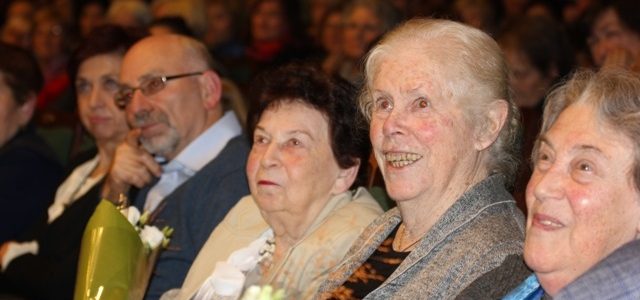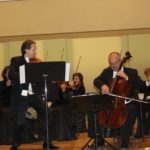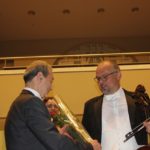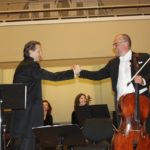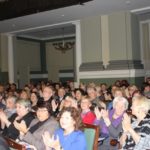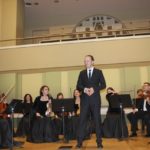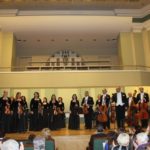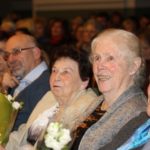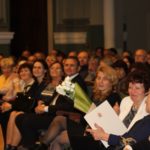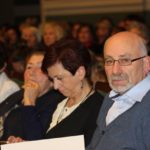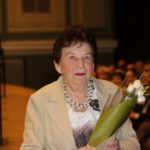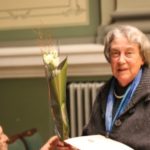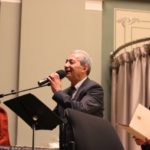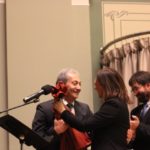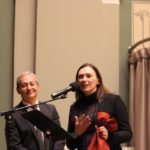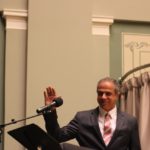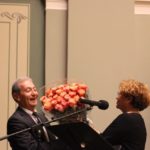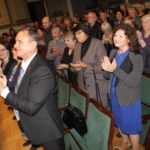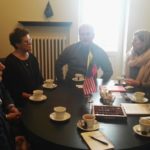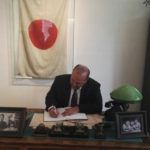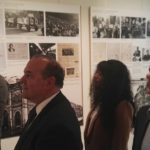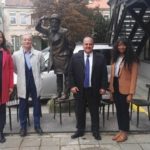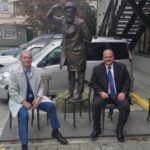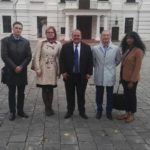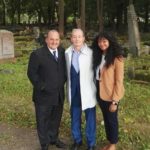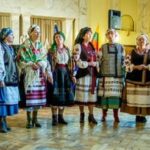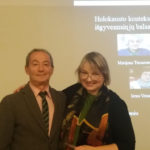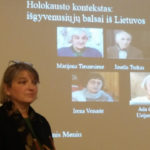In October the Kaunas Jewish Community experienced moments of celebration and painful losses, and commemorated the past.
The most momentous event in October was the celebration of the Community’s 30th birthday with a concert. The Kaunas State Philharmonic hosted the Klaipėda Chamber Orchestra accompanied by harpist Gabrielė Ašmontaitė, baritone Stein Skjervold and VilhelmasČepinskis on violin. Orchestra art director Mindaugas Bačkus presented a rich program of well-known and lesser-known works by Jewish and Litvak composers of different times and in different genres. He both played cello and presented the event.
The historian Linas Venclauskas told the audience about the history of the Jewish community and current events. He spoke about the Litvak contribution to Lithuania and together with KJC chairman Gercas Žakas presented thank-you letters from the Kaunas mayor and municipal culture department to long-standing and outstanding members of the Community, including Fruma Kučinskienė, Judita Mackevičienė, Motelius Rozenbergas, Basia Šragiene, Julijana Zarchi, Simonas Dovidavičius and Gercas Žakas himself.
Lithuanian Jewish Community chairwoman Faina Kukliansky, speaker of the Lithuanian parliament Viktoras Pranckietis, Israeli ambassador to Lithuania Amir Maimon and many others gave warm congratulations on the 30th anniversary of the restoration of the Kaunas Jewish Community. There were also many friends in the audience from the US embassy, the municipalities and social organizations. Besides being a lot of fun, the birthday celebration was also very educational.
A very different mood prevailed on the last Sunday of October, when the Community annually commemorates the Great Aktion at the Ninth Fort and the victims of the Kaunas ghetto. A dark sky, gloomy clouds and a biting wind accompanied memories of the victims of human madness. Chairman Žakas spoke about the selections on Democrat Square in the ghetto and historian and guide Chaim Bargmann told many little-known facts about the history of Slobodka and the ghetto set up there. Kaunas Hassidic Religious Community chairman Iser Shreiberg said kaddish.
Feiga Koganskienė, a witness to the Great Aktion, a long-standing member of the KJC and a Yiddish enthusiast and teacher, sadly passed away just before the commemoration. Chairman Žakas said her passing was like the end of an epoch.
The KJC tries not to get stuck looking inward all the time and strives to be an active part of the community and city by participating in all sorts of projects, events and meetings.
The Sugihara Fund/Diplomats for Life invited the public to a lecture from the Northern Casablanca Academy called “Voices of Kaunas: The Holocaust, Exile and World War II: Testimonies of Oral History,” presented by reporter Ina Navazelskis who has worked in the Oral History section of the Holocaust Museum in Washington, D.C., since 2001. She has conducted about 300 interviews in English, Lithuanian and German with survivors, eye-witnesses and those rescued. Now she’s planning to start interviewing the children of survivors.
Over more than 30 years of journalism Navazelskis has concentrated on Eastern Europe including recent history, and has written about the Baltic states during World War II and later in publications such as Newsday, Washington Post, Christian Science Monitor, St. Petersburg Times, Chicago Tribune, Philadelphia Inquirer, Transitions magazine, Index on Censorship, Die Zeit, Süddeutsche Zeitung, the newspaper Kauno diena, Ieva magazine and others. She has written several books, including “Leonid Brezhnev” (New York, 1987), “Alexander Dubček” (New York, 1990) and in Lithuanian “Fragmentai ir lūžiai: reportažai iš Vilniaus 1990-1991 metais” [“Fragments and Shards: Reports from Vilnius, 1990-1991”] (Vilnius, 2012). Some of her oral history interviews are on-line at https://collections.ushmm.org
The KJC also participated in a conference organized by the Veršvai Gymnasium, Vytautas Magnus University, Sugihara House museum and the International Commission to Assess the Crimes of the Nazi and Society Occupations Regimes in Lithuania called “Challenges to Human Values in a Changing Society” where chairman Žakas as well as Linas Venclauskas, philosopher Algirdas Davidavičius, reporter Donatas Puslys and others gave interesting presentations.
Members of the Community also attended a concert called “What Gray-Haired Borisfenas Talks About” to celebrate the 90th anniversary of the founding of the Lithuanian-Ukrainian Association and the 20th anniversary of the founding of the Kaunas Ukrainian Association, organized by the Kaunas Ukrainian Association and the Ukrainian Orthodox Community in Lithuania. The rich program of the event included Ukrainian classical, folk popular and instrumental music and poetry readings.
Special enovy for Holocaust issues Thomas K. Yazdgerdi from the US State Department’s Bureau of European and Eurasian Affairs also led a delegation of visitors to Kaunas. He has visited Lithuania before and has Lithuanian roots, but this was the first time he travelled to Kaunas. Yazdgerdi expressed deep interest in the Kaunas Jewish Community and in the lives of KJC members who had survived the Holocaust. He visited the Sugihara House museum, the Jewish cemetery and other Jewish sites in Kaunas. He said he was moved by the statue of Abraham Mapu, the founder of the Hebrew novel, erected in the city last May.


